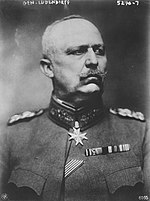Erich Ludendorff, Date of Birth, Place of Birth, Date of Death
TweetErich Ludendorff
German Army officer and later Nazi leader in Adolf Hitler's Beer Hall PutschAbout Erich Ludendorff
- Erich Friedrich Wilhelm Ludendorff (9 April 1865 – 20 December 1937) was a German general, the victor of the Battle of Liège and the Battle of Tannenberg.
- From August 1916, his appointment as Quartermaster general (German: Erster Generalquartiermeister) made him the leader (along with Paul von Hindenburg) of the German war efforts during World War I.
- His great strategic failure was that of Germany's great Spring Offensive in 1918 in its quest for total victory and he was forced out that October.After the war, Ludendorff became a prominent nationalist leader, and a promoter of the Stab-in-the-back myth, which posited that the German loss in World War I was caused by the betrayal of the German Army by Marxists, Bolsheviks, Freemasons and Jews who were furthermore responsible for the disadvantageous settlement negotiated for Germany in the Treaty of Versailles.
- He took part in the failed Kapp Putsch (coup d’état) with Wolfgang Kapp in 1920 and the Beer Hall Putsch of Adolf Hitler in 1923, and in 1925, he ran unsuccessfully for the office of President of Germany against his former superior Hindenburg. From 1924 to 1928, he represented the German Völkisch Freedom Party in the Reichstag (legislature).
- Consistently pursuing a purely military line of thought after the war, Ludendorff developed the theory of "Total War", which he published as Der totale Krieg (The Total War) in 1935.
- In this work, he argued that the entire physical and moral forces of the nation should be mobilized, because peace was merely an interval between wars.
- Ludendorff was a recipient of the Grand Cross of the Iron Cross and the Pour le Mérite.
Read more at Wikipedia
See Also
- Famous People's Birthdays on 09 April, Poland
- Famous People's Birthdays in April, Poland
- Famous People's Birthdays on 09 April, Germany
- Famous People's Birthdays in April, Germany
- Famous politician's Birthdays on 09 April, Poland
- Famous politician's Birthdays in April, Poland
- Famous military officer's Birthdays on 09 April, Poland
- Famous military officer's Birthdays in April, Poland
- Famous autobiographer's Birthdays on 09 April, Poland
- Famous autobiographer's Birthdays in April, Poland
- Famous politician's Birthdays on 09 April, Germany
- Famous politician's Birthdays in April, Germany
- Famous military officer's Birthdays on 09 April, Germany
- Famous military officer's Birthdays in April, Germany
- Famous autobiographer's Birthdays on 09 April, Germany
- Famous autobiographer's Birthdays in April, Germany


 Date of Birth:
Date of Birth:  Place of Birth: Kruszewnia, Greater Poland Voivodeship, Poland
Place of Birth: Kruszewnia, Greater Poland Voivodeship, Poland
